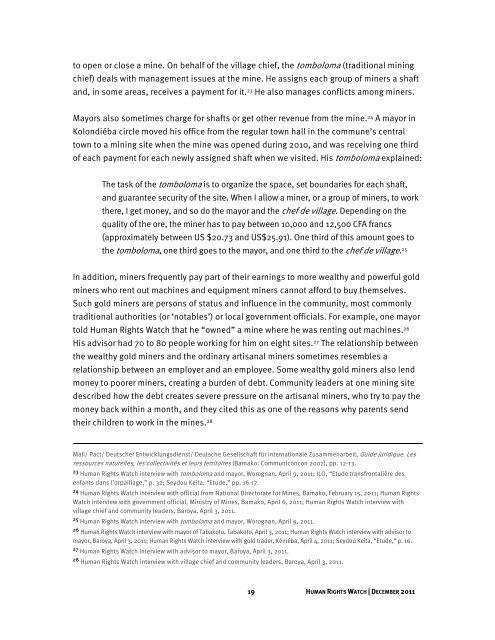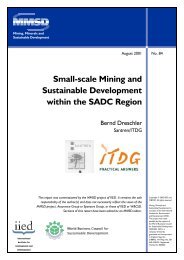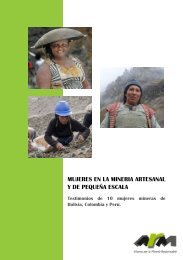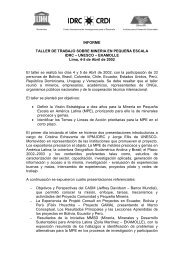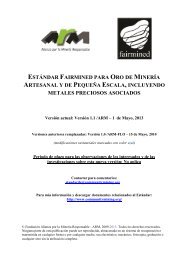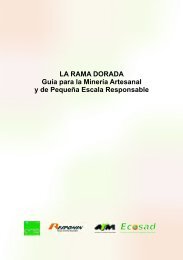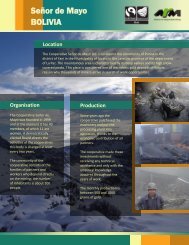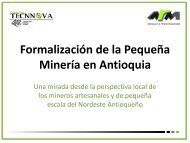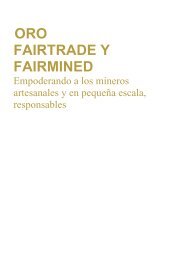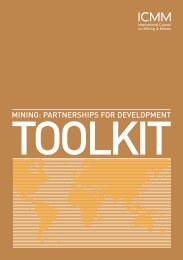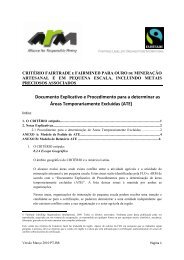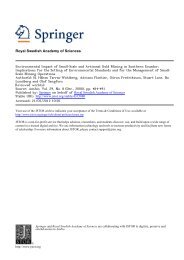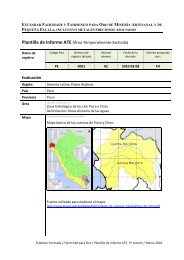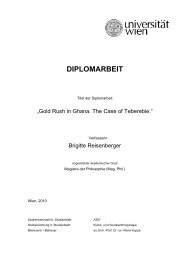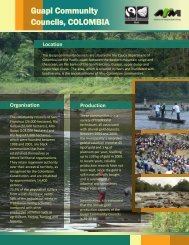A Poisonous Mix - Human Rights Watch
A Poisonous Mix - Human Rights Watch
A Poisonous Mix - Human Rights Watch
Create successful ePaper yourself
Turn your PDF publications into a flip-book with our unique Google optimized e-Paper software.
to open or close a mine. On behalf of the village chief, the tomboloma (traditional mining<br />
chief) deals with management issues at the mine. He assigns each group of miners a shaft<br />
and, in some areas, receives a payment for it. 23 He also manages conflicts among miners.<br />
Mayors also sometimes charge for shafts or get other revenue from the mine. 24 A mayor in<br />
Kolondiéba circle moved his office from the regular town hall in the commune’s central<br />
town to a mining site when the mine was opened during 2010, and was receiving one third<br />
of each payment for each newly assigned shaft when we visited. His tomboloma explained:<br />
The task of the tomboloma is to organize the space, set boundaries for each shaft,<br />
and guarantee security of the site. When I allow a miner, or a group of miners, to work<br />
there, I get money, and so do the mayor and the chef de village. Depending on the<br />
quality of the ore, the miner has to pay between 10,000 and 12,500 CFA francs<br />
(approximately between US $20.73 and US$25.91). One third of this amount goes to<br />
the tomboloma, one third goes to the mayor, and one third to the chef de village. 25<br />
In addition, miners frequently pay part of their earnings to more wealthy and powerful gold<br />
miners who rent out machines and equipment miners cannot afford to buy themselves.<br />
Such gold miners are persons of status and influence in the community, most commonly<br />
traditional authorities (or ‘notables’) or local government officials. For example, one mayor<br />
told <strong>Human</strong> <strong>Rights</strong> <strong>Watch</strong> that he “owned” a mine where he was renting out machines. 26<br />
His advisor had 70 to 80 people working for him on eight sites. 27 The relationship between<br />
the wealthy gold miners and the ordinary artisanal miners sometimes resembles a<br />
relationship between an employer and an employee. Some wealthy gold miners also lend<br />
money to poorer miners, creating a burden of debt. Community leaders at one mining site<br />
described how the debt creates severe pressure on the artisanal miners, who try to pay the<br />
money back within a month, and they cited this as one of the reasons why parents send<br />
their children to work in the mines. 28<br />
Mali/ Pact/ Deutscher Entwicklungsdienst/ Deutsche Gesellschaft für Internationale Zusammenarbeit, Guide juridique. Les<br />
ressources naturelles, les collectivités et leurs territoires (Bamako: Communiconcon 2007), pp. 12-13.<br />
23 <strong>Human</strong> <strong>Rights</strong> <strong>Watch</strong> interview with tomboloma and mayor, Worognan, April 9, 2011; ILO, “Etude transfrontalière des<br />
enfants dans l’orpaillage,” p. 32; Seydou Keita, “Etude,” pp. 16-17.<br />
24 <strong>Human</strong> <strong>Rights</strong> <strong>Watch</strong> interview with official from National Directorate for Mines, Bamako, February 15, 2011; <strong>Human</strong> <strong>Rights</strong><br />
<strong>Watch</strong> interview with government official, Ministry of Mines, Bamako, April 6, 2011; <strong>Human</strong> <strong>Rights</strong> <strong>Watch</strong> interview with<br />
village chief and community leaders, Baroya, April 3, 2011.<br />
25 <strong>Human</strong> <strong>Rights</strong> <strong>Watch</strong> interview with tomboloma and mayor, Worognan, April 9, 2011.<br />
26 <strong>Human</strong> <strong>Rights</strong> <strong>Watch</strong> interview with mayor of Tabakoto, Tabakoto, April 3, 2011; <strong>Human</strong> <strong>Rights</strong> <strong>Watch</strong> interview with advisor to<br />
mayor, Baroya, April 3, 2011; <strong>Human</strong> <strong>Rights</strong> <strong>Watch</strong> interview with gold trader, Kéniéba, April 4, 2011; Seydou Keita, “Etude,” p. 16.<br />
27 <strong>Human</strong> <strong>Rights</strong> <strong>Watch</strong> interview with advisor to mayor, Baroya, April 3, 2011.<br />
28 <strong>Human</strong> <strong>Rights</strong> <strong>Watch</strong> interview with village chief and community leaders, Baroya, April 3, 2011.<br />
19 HUMAN RIGHTS WATCH | DECEMBER 2011


